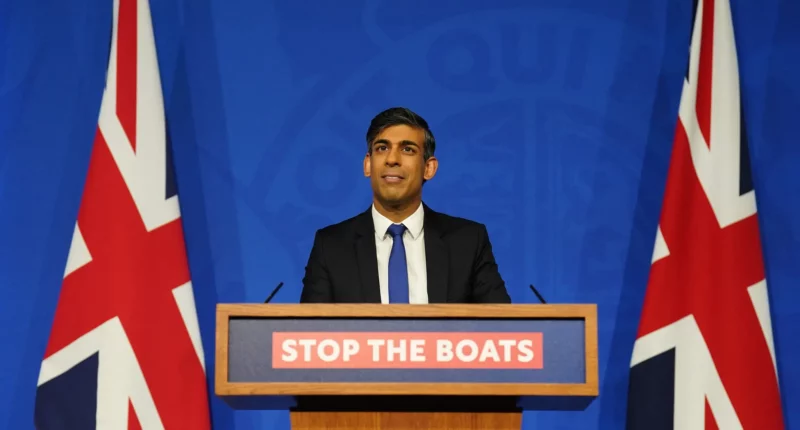Prime Minister Rishi Sunak of Britain survived a major threat to his leadership on Tuesday, advancing his flagship immigration policy over the objections of hard-right factions in his Conservative Party. But the victory may prove fleeting as he faces several more hurdles to the plan, which would deport asylum seekers to Rwanda.
While about two dozen Conservative lawmakers abstained from voting on the policy, the party’s 56-seat majority ensured that it went through by a vote of 313 to 269.
That was a relief to Mr. Sunak, who has lashed his political fortunes to the ambitious, some say impossible, goal of stopping the arrival of migrants on small boats across the English Channel. A defeat would have pitched him into crisis and could even have prompted a leadership challenge.
Yet the touch-and-go nature of the vote sent an ominous signal about Mr. Sunak’s grip on his party on the eve of an election season. The Rwanda legislation now moves to the House of Lords, the unelected upper chamber of Parliament, where it is likely to get a hostile reception from members, many of whom have been harshly critical of the government’s hard-line approach.
Then it will face yet another vote in the House of Commons, where right-wing lawmakers who allowed it to pass on Tuesday have vowed to demand amendments to make the bill even more draconian.
Beyond the legislative maneuvering lies a treacherous political landscape for Mr. Sunak. He has chosen to make stopping the flow of asylum seekers — some of whom land in rickety boats after hazardous sea crossings — one of the linchpins of his party’s campaign to stay in power after 13 years.

But his plan to deter migrants by threatening to send them to a small African country has become totemic, both for critics who condemn it as abusive and inhumane and for hard-right Conservatives, who view it as part of the Brexit promise to regain control of Britain’s borders.
The latest version of the plan, which the government acknowledges comes close to breaching international law, has divided the Tories and revived memories of polarizing debates over leaving the European Union.
Adding to the fraught atmosphere on Tuesday was the news that a migrant had died on board the Bibby Stockholm, a barge docked off the coast of Dorset, southwestern England, that is being used to house asylum seekers. The Times of London, quoting Richard Drax, member of Parliament for South Dorset, reported that the death was a case of suicide.
In a post on social media after the vote, Mr. Sunak vowed to win passage of the legislation. “The British people should decide who gets to come to this country — not criminal gangs or foreign courts,” he wrote.
Critics, however, note that even if the Rwanda legislation survives all future political and legal challenges, the likelihood that a large number of asylum seekers will ever be put on one-way flights to the African country is small. Litigation over the policy could stretch until the next general election, experts said, and the opposition Labour Party has vowed to ditch the plan if it wins power.
The current government’s single-minded focus on the issue has deflected attention from other issues that matter to voters, such as tackling the cost of living crisis or improving the country’s struggling health care system.
Mr. Sunak found himself in this predicament after Britain’s Supreme Court struck down the original Rwanda policy for being in breach of domestic and international human rights laws. The government then negotiated a treaty with Rwanda, declaring it a “safe” destination for asylum seekers — contradicting the court — and revised the legislation to override the ability of courts to invalidate the law or block asylum transfers.
Mr. Sunak’s immediate challenge is in the House of Lords, which will scrutinize the legislation, tack on its own amendments, and send it back to the House of Commons. The Commons will then most likely reverse those amendments and kick it back to the Lords — a process colloquially referred to as Ping-Pong.
“We’re not the kind of people who love filibustering into the night,” said David Anderson, a barrister and member of the House of Lords who is not affiliated to any political party there. “We trade on our wisdom and common sense, not as firebrands. But we can greatly extend the period of time that the government will need to get its bill through — and in the last resort we could block it.”
Mr. Anderson added, “I believe that undoubtedly, this bill breaches our international obligations.”
With the bill at an early parliamentary stage, some right-wing lawmakers were betting that it could be amended later. Iain Duncan Smith, a former Conservative Party leader and a leading figure on the right, said that he would support the legislation, adding that, although there were “flaws” in the bill, there could be discussions at a later stage to decide “where it needs tightening up.”

“If we stop it now, we start all over again, and lose further confidence with the public,” Mr. Duncan Smith wrote on social media.
In lobbying rebellious lawmakers, Downing Street promised to listen to the objections of the Conservative right, even though Mr. Sunak has said that the legislation could not be hardened without breaching international law.
That message seemed to have shifted slightly when he met some of the rebels over breakfast on Tuesday. Mr. Sunak was reported to have hinted that he could offer further concessions but gave no concrete details. It remained unclear whether future changes to the draft were possible or whether he was contemplating making vaguer, less binding verbal statements to his critics in Parliament.
Mr. Sunak knows that offering more to right-wingers would infuriate centrist lawmakers in his party. They have made it clear that they will accept the bill as it is drafted, but not if it is hardened.
In legal terms, Mr. Sunak has little room for maneuver. Preventing individual appeals from those facing deportation — as many on the right would like — would break international law and might prompt the Rwandan government to abandon the policy, according to the British government’s summary of its legal position.
Denying all appeals, it said, would mean “that those unfit to fly, for example those in the late stages of pregnancy, or sufferers of very rare medical conditions that could not be cared for in Rwanda, could be removed with no right to judicial scrutiny.”
“Completely blocking any court challenges would be a breach of international law and alien to the U.K.’s constitutional tradition of liberty and justice,” the document added.
That underscored the extent to which Mr. Sunak is caught in a political double bind. While right wingers want the government to go further, the bill is likely to face the opposite pressure from centrists and in the House of Lords.
“Do I see any way it could get through? Yes, I do,” said Philip Cowley, a professor of politics at Queen Mary University of London, “but it’s going to be very messy, very noisy and it could easily fall at multiple stages.”
“I can see how it gets watered down, but it’s very hard to see how it gets made stronger,” he added.






